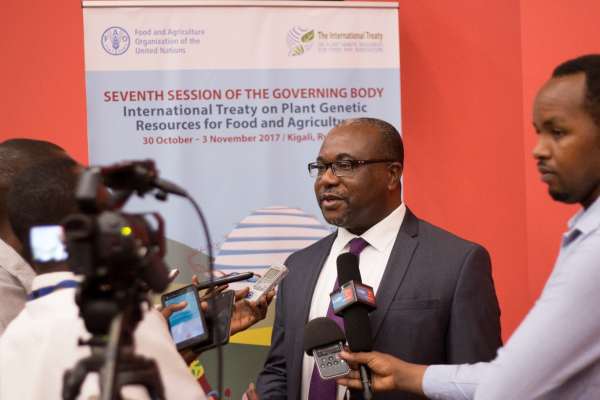African nations adopt a common position on the International Plant Treaty

03/10/2017
September 20, 2017, Kigali: Delegates from the African Union Commission convened in Rwanda for a two-day Regional Workshop on the Implementation of the International Treaty on Plant Genetic Resources for Food and Agriculture (ITPGRFA). The Workshop provided African countries the opportunity to coordinate their position and strengthen their negotiating capacity in preparation for the Seventh Session of the Governing Body of the International Treaty that will be held in Kigali, Rwanda, from 30 October to 3 November 2017.
The theme of the Seventh Session is ‘The 2030 Agenda for Sustainable Development and the Role of Plant Genetic Resources for Food and Agriculture.’
Addressing participants at the opening day of the Workshop, Assistant FAO Representative to Rwanda, Otto Vianney Muhinda, spoke of the importance of a consolidated African position on issues of common interest and said that this would contribute to the overall success of the Governing Body session in Kigali. This will be the first time this global policy forum is being convened in Sub-Saharan Africa.
“This Workshop provides a unique opportunity for African regional delegates to interact with one another and arrive at a common regional position on issues to be discussed during the Governing Body meeting in Kigali,” said Kent Nnadozie, Secretary (a.i.) of the International Treaty.
The Seventh Session of the Governing Body will bring together representatives from 144 member countries of the International Treaty, in addition to NGOs, Civil Society Organizations, other International Organizations and Observers, drawing more than 600 participants from around the world.
Seeking a common position
Workshop participants comprised national policy-makers and experts in the field of crop conservation and plant breeding, who discussed the important role of plant genetic resources for food and agriculture in the 2030 Agenda for Sustainable Development, and arrived at common position on issues to be discussed during the Governing Body meeting in Kigali this October. They also discussed how decisions made at the Seventh Governing Body would be translated into national policy.
Among other issues of particular interest to the African region were more equitable and easier access to different varieties of seeds, and the equitable sharing of the benefits arising from the use of material in the International Treaty’s Multilateral System of Access and Benefit-sharing, which currently includes over 1.4 million samples of plant genetic material for food and agriculture from around the world. Delegates also exchanged views on facilitated exchange and the importance of mobilizing resources to support farmers, who are the custodians of plant varieties, particularly in developing countries.
The African Union efforts thus far
The African Union (AU) has been active in biodiversity conservation and member countries have joined a number global pacts in addition to the International Treaty, including the Multilateral Environmental Agreement and Nagoya protocol.
“Agriculture is one of the cornerstones for the livelihood and survival of the people of the continent,” said Dr. Janet Edeme, Head of Rural Economy Division, Department of Rural Economy and Agriculture of the African Union Commission.
Role of the Plant Treaty
The International Treaty’s Multilateral System of Access and Benefit-Sharing provides facilitated access to a vast variety of plant genetic material for scientists and plant breeders to develop crop varieties better adapted to changing climate, pests and disease.

Mr Kent Nnadozie, Secretary a.i. of the Intenational Treaty on PGRFA
